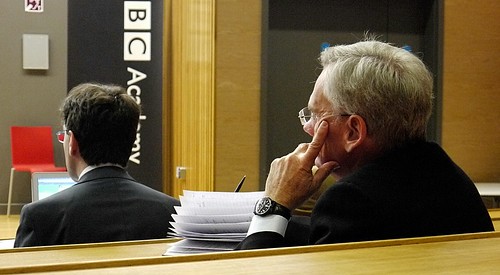At the POLIS conference in LSE on Friday.
Fading beauty
in our garden, this afternoon.
The academic uses of social networking
I know it’s long (over an hour), but this video from a Berkman Center discussion of social networking in which a quartet of Harvard academics talk about their interactions with, and reflections on, social networking is worth it.
The Dutch do the right thing
Hurrah! The Netherlands has become the first European country to enshrine Net Neutrality in law. This from The Register.
The Dutch Parliament yesterday agreed to make the Netherlands the first nation in Europe to officially put net neutrality principles into law. The law will force ISPs and telecom operators to ensure access to all types of content, services or applications available on the network.
The new telecom law has won a near unanimous vote, despite fierce opposition from telecom operators, who had been planning to charge for over-the-top services, such as Skype or WhatsApp Messenger, which bypass traditional cellular communications. Vodafone Netherlands is currently still blocking the use of Skype on its 3G mobile network.
Facing sharp criticism, the largest Dutch political party – the liberal VVD – withdrew an amendment which would still allow carriers and ISPs to charge extra for services. The proposal came from Afke Schaart, who until last year was Director of Public Affairs for KPN, the biggest telecom operator in the Netherlands.
In recent months, Dutch telecom operators have complained that the volume of text messaging is slowing sharply because of cross-platform mobile messaging apps which allow users to exchange messages without having to pay for SMSes.
Poetry corner
This is a passage from T.S. Eliot’s great modernist poem, The Waste Land.
The time is now propitious, as he guesses,
The meal is ended, she is bored and tired,
Endeavours to engage her in caresses
Which still are unreproved, if undesired.
Flushed and decided, he assaults at once;
Exploring hands encounter no defence;
His vanity requires no response,
And makes a welcome of indifference.
(And I Tiresias have foresuffered all
Enacted on this same divan or bed;
I who have sat by Thebes below the wall
And walked among the lowest of the dead.)
Bestows on final patronising kiss,
And gropes his way, finding the stairs unlit…
Q: Why does this passage remind one of a famous international banker?
Origin of the Twitter hashtag
The madness of the US healthcare system
Astonishing column by Ezra Klein in the Washington Post.
Everyone knows — or should know — that the United States spends much more than any other country on health care. But the Kaiser Family Foundation broke that spending down into two parts: the government’s share and the private sector’s share (both measured as a percentage of total gross domestic product), then compared the results to figures from 12 other countries that are members of the Organisation for Economic Co-operation and Development. And here’s the shocker: Our government spends more on health care than the governments of Japan, Australia, Norway, the United Kingdom, Spain, Italy, Canada or Switzerland.
Think about that for a minute. Canada has a single-payer health-care system. The government is the only insurer of any note. The United Kingdom has a socialized system, in which the government is not only the sole insurer of note but also employs most of the doctors and nurses and runs most of the hospitals. And yet, measured as a share of the economy, our government health-care system is the largest of the bunch.
And it’s worse than that: Atop our giant government health-care sector, we have an even more giant private health-care sector. Altogether, we’re spending about 16 percent of the GDP on health care. No other country even tops 12 percent. Which means we’ve got the worst of both worlds: huge government and high costs.
Online banking, pshaw
Much to the annoyance of some of my consultancy clients and my bank — and the amazement of friends (“What? Call yourself a technology columnist and not use Internet banking!!!”) — I don’t use online banking for the simple reason that I don’t think it’s secure. So this report from Good Morning Silicon Valley is grist to my mill.
The high-profile cyberattacks continue: Citigroup has been hacked, too, it told the Financial Times Wednesday. The May attack allowed hackers to access the names, account numbers and contact information of about 200,000 North American customers of the company, according to Reuters. Citigroup says other information such as card security codes, expiration dates and customers’ Social Security numbers are kept elsewhere and were not accessed.
While the FT quoted a Gartner analyst who said that “for the actual breach to happen at a bank is a very big deal,” because banks’ online systems are usually more secure, Federal Deposit Insurance Corp. Chairman Sheila Bair said this morning that banks are frequent targets, according to the Reuters article. Bair said the FDIC may push banks to improve their online-security measures.
On a related note, and in case you missed it: What does happen when your bank gets hacked and your money is stolen? According to a judge’s ruling in one case in Maine, the bank can only do so much. Wired’s Threat Level blog reports that a construction company that fell victim to a password-stealing Trojan on an employee’s computer is out of luck in trying to recover about $300,000 from Ocean Bank. While Magistrate Judge John Rich agreed that the bank could stand to have a more secure authentication system, he said the law does not require it to have such a system, and that its system is comparable to that of other banks.
The New College of the Old Elite
Nice LRB blog post by Glen Newey.
The New College for the Humanities must have looked like a winner on paper. A higher education Britain’s Got Talent fronted by celebrity academics not just on the payroll, but taking a dividend. Financiers on board. Mayor BoJo’s blessing. Saudi princes by the tanker-load offering their custom. And then the project has seemingly shrivelled faster than a LibDem campaign rosette. Birkbeck swiftly distances itself from the NCH and parts company with its founder. The college’s financial, fiscal and institutional status prove foggy. It turns out that the Cannadine-Colleys are only showing up for one lecture each a year. Poor A.C. Grayling gets ambushed in Foyle’s and smoke-bombed when all he wanted to do was puff his college and shift a few copies of his rewrite of the Bible. Is nothing sacred?
[…]
The problem with the NCH is not that it is ‘elite’, or that several of the big names are getting on. The problem is that it epitomises the worst features of the 2012-spec UK higher education system: it amplifies rather than damping down inequalities inherited from UK schools’ state/fee-paying apartheid, and makes ability to pay a further necessary condition beyond academic ability for admission. It also doubles students’ indebtedness and it’s not yet clear – as became plain in an interview Grayling gave this week – that NCH students will be eligible for a loan. The big-ticket professoriate will exemplify trends in the HE sector generally, where salaried faculty’s research time is bought out with low-cost teaching by casual staff.
Economic indicators and the 2012 Olympics
Strange goings-on with Olympics tickets.
Probably the most complicated system for buying tickets ever thought up by man is in a new phase. The London Organising Committee (LOCOG) has run the initial ballot and assigned the first round of tickets. They've now taken money out of the accounts of those who were successful in the ballot and had a functioning visa account.
There could however be another chance for people who were unsuccessful as there are thousands of transactions that LOCOG have been unable to process because people's accounts have not had the money in or because the bank details have been incorrect for example. There are numerous reasons why a transaction could fail but if they try three times and it still fails, then the next person on the ballot waiting list gets the tickets.
I wonder if there might be another explanation. Could this be a reflection of a downturn in people’s economics circs? Maybe they’ve been forced to tear up their credit cards? Or have simple maxed out? Hmmm….
Doesn’t affect me. I propose to leave the country while the games are in progress.



